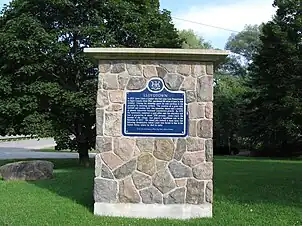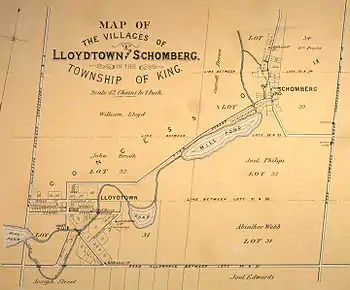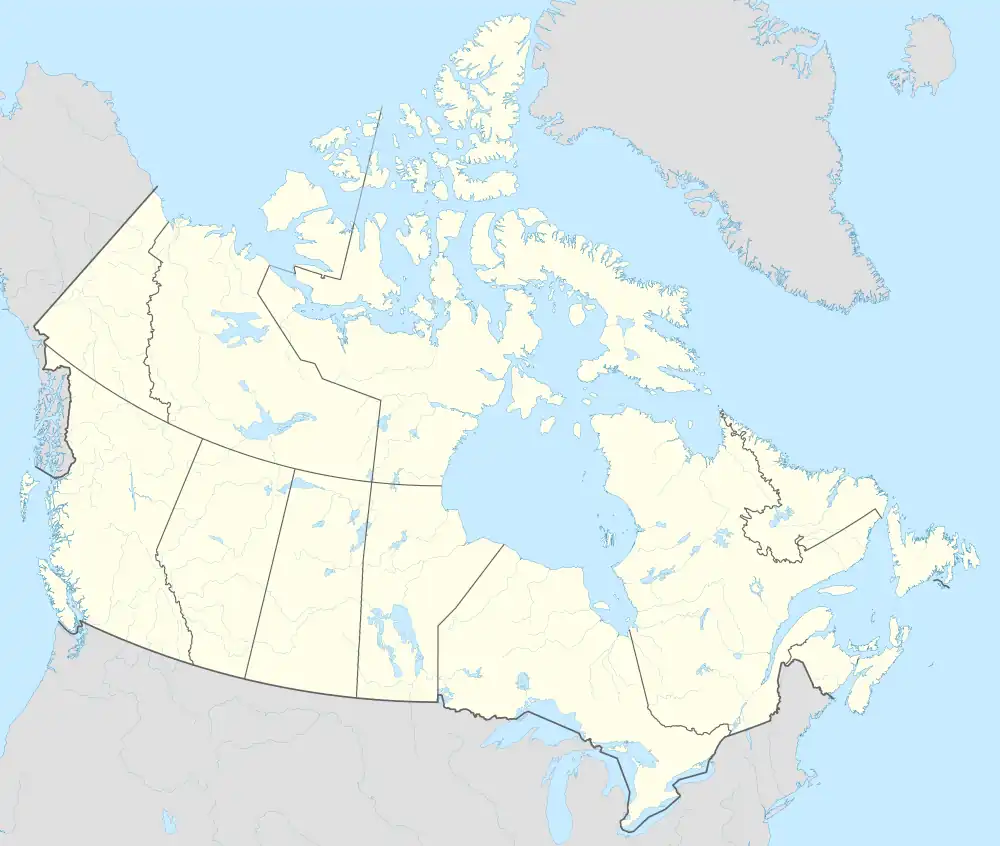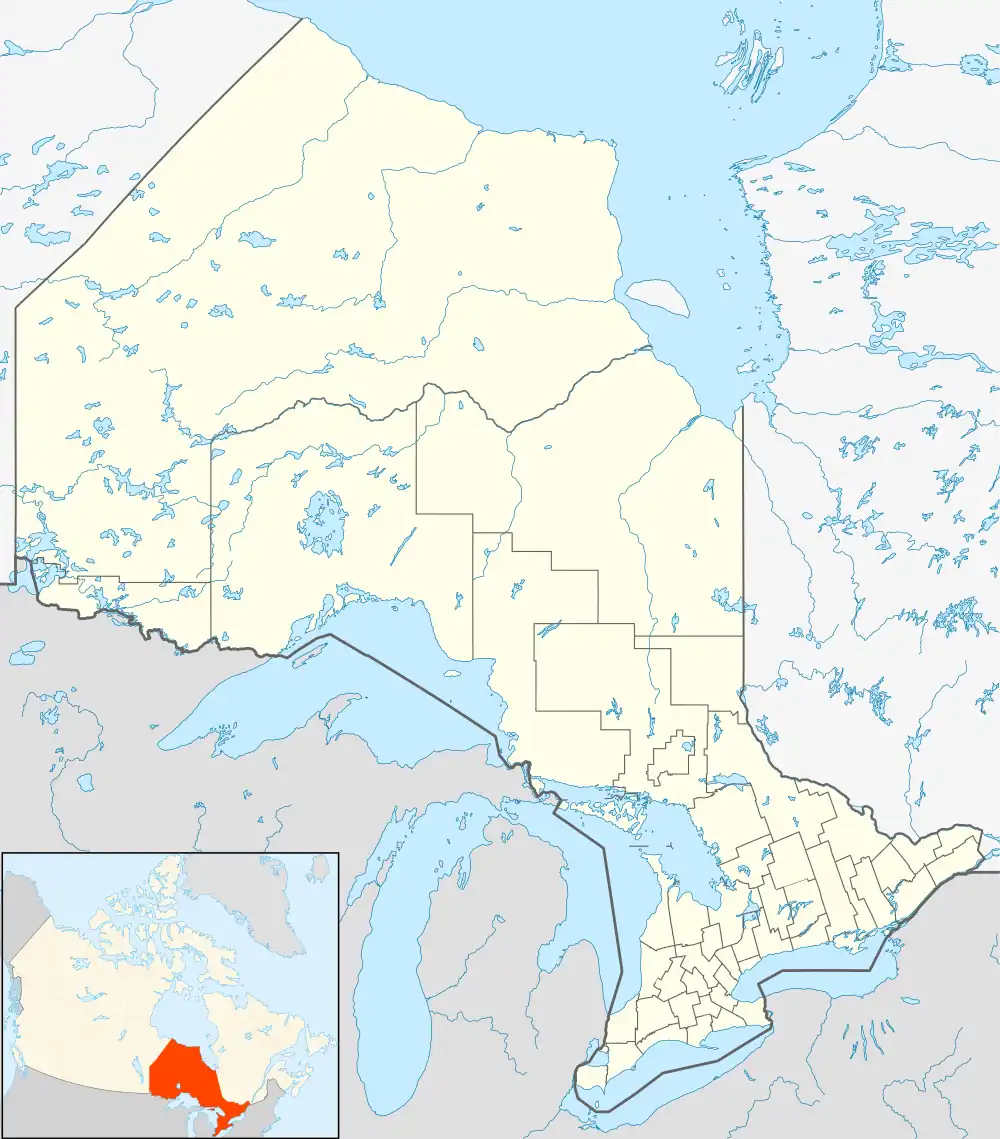Lloydtown, Ontario
Lloydtown is a hamlet located in King Township, Ontario, Canada. It is often associated with the surrounding and larger Schomberg, though it has its own unique characteristics and heritage.
Lloydtown | |
|---|---|
Unincorporated community | |
 Jesse Lloyd historical plaque. | |
 A map from 1878 showing lots 30-34 in King Township, including the communities of Lloydtown and Schomberg. | |
 Lloydtown Location within Canada  Lloydtown Location within Ontario  Lloydtown Location within North America | |
| Coordinates: 43°59′27″N 79°41′41″W | |
| Country | Canada |
| Province | Ontario |
| Regional Municipality | York |
| Township | King |
| Government | |
| • Township mayor | Steve Pellegrini |
| • MP | Deb Schulte |
| • MPP | Stephen Lecce |
| • Councillor | Bill Cober (Ward 4) |
| Time zone | UTC-5 (EST) |
| • Summer (DST) | UTC-4 (EDT) |
| Forward sortation area | |
| Area code(s) | 905 and 289 |
| NTS Map | 030M13 |
| GNBC Code | FBZYW |
History
The Lloydtown Rebellion of 1837 was part of the Upper Canada Rebellion. During the 1830s, Lloydtown was well known as a site for reform sympathisers, and regular meetings were hosted by Jesse Lloyd. On November 24, 1837, a final meeting to review plans was held between Lloyd and William Lyon Mackenzie. Hoping to take advantage of the departure of troops to Lower Canada in response to the Lower Canada Rebellion, Mackenzie had planned to seize a government arms cache in York on December 7.
Climate
Lloydtown has a continental climate moderated by the Great Lakes and influenced by warm, moist air masses from the south, and cold, dry air from the north. The Oak Ridges Moraine affects levels of precipitation: as an air mass arrives from Lake Ontario and reaches the elevated ground surface of the moraine, it rises causing precipitation.[1]
| Climate data for Lloydtown | |||||||||||||
|---|---|---|---|---|---|---|---|---|---|---|---|---|---|
| Month | Jan | Feb | Mar | Apr | May | Jun | Jul | Aug | Sep | Oct | Nov | Dec | Year |
| Record high °C (°F) | 13.0 (55.4) |
14.5 (58.1) |
24.0 (75.2) |
30.0 (86.0) |
32.5 (90.5) |
35.5 (95.9) |
36.0 (96.8) |
35.6 (96.1) |
33.0 (91.4) |
27.0 (80.6) |
24.0 (75.2) |
20.0 (68.0) |
36.0 (96.8) |
| Average high °C (°F) | −3.4 (25.9) |
−2.3 (27.9) |
3.1 (37.6) |
11.0 (51.8) |
18.5 (65.3) |
23.6 (74.5) |
26.3 (79.3) |
25.1 (77.2) |
20.1 (68.2) |
13.1 (55.6) |
6.0 (42.8) |
−0.4 (31.3) |
11.7 (53.1) |
| Average low °C (°F) | −11.4 (11.5) |
−10.6 (12.9) |
−5.5 (22.1) |
1.2 (34.2) |
6.4 (43.5) |
11.3 (52.3) |
13.9 (57.0) |
13.0 (55.4) |
9.0 (48.2) |
3.6 (38.5) |
−1.0 (30.2) |
−7.2 (19.0) |
1.9 (35.4) |
| Record low °C (°F) | −36.0 (−32.8) |
−33.0 (−27.4) |
−29.0 (−20.2) |
−14.0 (6.8) |
−4.0 (24.8) |
−2.0 (28.4) |
2.5 (36.5) |
0.5 (32.9) |
−6.5 (20.3) |
−8.9 (16.0) |
−22.0 (−7.6) |
−31.5 (−24.7) |
−36.0 (−32.8) |
| Average precipitation mm (inches) | 53.9 (2.12) |
44.4 (1.75) |
55.0 (2.17) |
62.8 (2.47) |
72.0 (2.83) |
75.1 (2.96) |
87.8 (3.46) |
88.6 (3.49) |
83.3 (3.28) |
68.3 (2.69) |
57.3 (2.26) |
25.4 (1.00) |
690.9 (27.20) |
| Source: Environment Canada[2] | |||||||||||||
Notable people
- Alfred M. Cook, American politician and farmer, was born in Lloydtown.[3]
References
- "Bradford Muck Research, Ontario". Canadian Climate Normals 1971-2000. Environment Canada. Retrieved 2012-02-29.
Notes
- Cf. Toronto and Region Conservation Authority, Rouge River Watershed Plan Report (2007), 15.
- Environment Canada
- 'Wisconsin Blue Book 1901,' Biographical Sketch of Alfred M. Cook, pg. 754
External links
- Walter Rolling. "Living in King: Villages". Walter Rolling Online. King Township Public Library. Archived from the original on 2014-05-03.